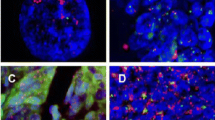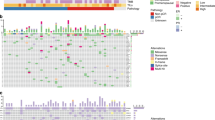Abstract
Background
Comprehensive genomic profiling is used to guide the management of metastatic colorectal cancer (mCRC); however, the role of PIK3CA mutations, present in up to 20% of mCRCs, is unclear.
Objective
This study aimed to evaluate the association of PIK3CA mutations with other common mutations in mCRC and determine the prognostic and predictive value of PIK3CA mutations.
Patients and Methods
A retrospective chart review was performed on patients in the Moffitt Clinical Genomic Database with mCRC. A meta-analysis was performed to further evaluate the predictive value of PIK3CA mutations to the response to anti-epidermal growth factor receptor (EGFR) therapy.
Results
Among 639 patients, PIK3CA was positively correlated with KRAS mutation (r = 0.11, p = 0.006) and negatively correlated with TP53 mutation (r = − 0.18, p ≤ 0.001) and ERBB2 amplification (r = − 0.08, p = 0.046). The median overall survival (OS) of patients with PIK3CA-mutant mCRC (n = 49) was 35.5 (95% confidence interval [CI] 18.7–48.1) months vs. 55.3 (95% CI 47.5–65.6) months for PIK3CA wild-type mCRC (n = 286) [p = 0.003]. This OS difference remained significant with exon 9 and exon 20 subset analyses. There was no significant difference in response rate between patients with PIK3CA wild-type (n = 97) versus mutant (n = 9) mCRC who received anti-EGFR therapy (43% vs. 56%, p = 0.61) and no significant difference in median progression-free survival (PFS) of 10.3 versus 7.2 months (p = 0.60). However, our meta-analysis of 12 studies, including ours, using a common effect model identified that PIK3CA mutations are associated with reduced response to anti-EGFR therapy, with a relative risk of 0.56 (95% CI 0.38–0.82).
Conclusion
Our study identified PIK3CA mutations as a poor prognostic factor, and our meta-analysis identified PIK3CA mutations as predictive of decreased response to anti-EGFR therapy in patients with mCRC.





Similar content being viewed by others
References
Cathomas G. PIK3CA in colorectal cancer. Front Oncol. 2014;4:35.
Van Cutsem E, Cervantes A, Adam R, Sobrero A, Van Krieken JH, Aderka D, et al. ESMO consensus guidelines for the management of patients with metastatic colorectal cancer. Ann Oncol. 2016;27(8):1386–422.
Rodriguez-Bigas MA LE, Crane CH. Stage IV colorectal cancer. In: Kufe DW PR, Weichselbaum RR, et al., editors. Holland-Frei cancer medicine. 6th ed. Hamilton: BC Decker; 2003.
Guinney J, Dienstmann R, Wang X, de Reynies A, Schlicker A, Soneson C, et al. The consensus molecular subtypes of colorectal cancer. Nat Med. 2015;21(11):1350–6.
Lievre A, Bachet JB, Le Corre D, Boige V, Landi B, Emile JF, et al. KRAS mutation status is predictive of response to cetuximab therapy in colorectal cancer. Cancer Res. 2006;66(8):3992–5.
Lenz HJ. Cetuximab in the management of colorectal cancer. Biologics. 2007;1(2):77–91.
Allegra CJ, Jessup JM, Somerfield MR, Hamilton SR, Hammond EH, Hayes DF, et al. American Society of Clinical Oncology provisional clinical opinion: testing for KRAS gene mutations in patients with metastatic colorectal carcinoma to predict response to anti-epidermal growth factor receptor monoclonal antibody therapy. J Clin Oncol. 2009;27(12):2091–6.
Sartore-Bianchi A, Moroni M, Veronese S, Carnaghi C, Bajetta E, Luppi G, et al. Epidermal growth factor receptor gene copy number and clinical outcome of metastatic colorectal cancer treated with panitumumab. J Clin Oncol. 2007;25(22):3238–45.
Perrone F, Lampis A, Orsenigo M, Di Bartolomeo M, Gevorgyan A, Losa M, et al. PI3KCA/PTEN deregulation contributes to impaired responses to cetuximab in metastatic colorectal cancer patients. Ann Oncol. 2009;20(1):84–90.
Huang L, Liu Z, Deng D, Tan A, Liao M, Mo Z, et al. Anti-epidermal growth factor receptor monoclonal antibody-based therapy for metastatic colorectal cancer: a meta-analysis of the effect of PIK3CA mutations in KRAS wild-type patients. Arch Med Sci. 2014;10(1):1–9.
Moroni M, Veronese S, Benvenuti S, Marrapese G, Sartore-Bianchi A, Di Nicolantonio F, et al. Gene copy number for epidermal growth factor receptor (EGFR) and clinical response to antiEGFR treatment in colorectal cancer: a cohort study. Lancet Oncol. 2005;6(5):279–86.
Prenen H, De Schutter J, Jacobs B, De Roock W, Biesmans B, Claes B, et al. PIK3CA mutations are not a major determinant of resistance to the epidermal growth factor receptor inhibitor cetuximab in metastatic colorectal cancer. Clin Cancer Res. 2009;15(9):3184–8.
De Roock W, Claes B, Bernasconi D, De Schutter J, Biesmans B, Fountzilas G, et al. Effects of KRAS, BRAF, NRAS, and PIK3CA mutations on the efficacy of cetuximab plus chemotherapy in chemotherapy-refractory metastatic colorectal cancer: a retrospective consortium analysis. Lancet Oncol. 2010;11(8):753–62.
Perkins G, Lievre A, Ramacci C, Meatchi T, de Reynies A, Emile JF, et al. Additional value of EGFR downstream signaling phosphoprotein expression to KRAS status for response to anti-EGFR antibodies in colorectal cancer. Int J Cancer. 2010;127(6):1321–31.
Soeda H, Shimodaira H, Watanabe M, Suzuki T, Gamoh M, Mori T, et al. Clinical usefulness of KRAS, BRAF, and PIK3CA mutations as predictive markers of cetuximab efficacy in irinotecan- and oxaliplatin-refractory Japanese patients with metastatic colorectal cancer. Int J Clin Oncol. 2013;18(4):670–7.
Iwamoto S, Hazama S, Kato T, Miyake Y, Fukunaga M, Matsuda C, et al. Multicenter phase II study of second-line cetuximab plus folinic acid/5-fluorouracil/irinotecan (FOLFIRI) in KRAS wild-type metastatic colorectal cancer: the FLIER study. Anticancer Res. 2014;34(4):1967–73.
Lupini L, Bassi C, Mlcochova J, Musa G, Russo M, Vychytilova-Faltejskova P, et al. Prediction of response to anti-EGFR antibody-based therapies by multigene sequencing in colorectal cancer patients. BMC Cancer. 2015;15:808.
Sartore-Bianchi A, Di Nicolantonio F, Nichelatti M, Molinari F, De Dosso S, Saletti P, et al. Multi-determinants analysis of molecular alterations for predicting clinical benefit to EGFR-targeted monoclonal antibodies in colorectal cancer. PLoS ONE. 2009;4(10): e7287.
Wong NS, Fernando NH, Nixon AB, Cushman S, Aklilu M, Bendell JC, et al. A phase II study of capecitabine, oxaliplatin, bevacizumab and cetuximab in the treatment of metastatic colorectal cancer. Anticancer Res. 2011;31(1):255–61.
Molinari F, Felicioni L, Buscarino M, De Dosso S, Buttitta F, Malatesta S, et al. Increased detection sensitivity for KRAS mutations enhances the prediction of anti-EGFR monoclonal antibody resistance in metastatic colorectal cancer. Clin Cancer Res. 2011;17(14):4901–14.
Zhang J, Zheng J, Yang Y, Lu J, Gao J, Lu T, et al. Molecular spectrum of KRAS, NRAS, BRAF and PIK3CA mutations in Chinese colorectal cancer patients: analysis of 1,110 cases. Sci Rep. 2015;5:18678.
Janku F, Lee JJ, Tsimberidou AM, Hong DS, Naing A, Falchook GS, et al. PIK3CA mutations frequently coexist with RAS and BRAF mutations in patients with advanced cancers. PLoS ONE. 2011;6(7): e22769.
Whitehall VL, Rickman C, Bond CE, Ramsnes I, Greco SA, Umapathy A, et al. Oncogenic PIK3CA mutations in colorectal cancers and polyps. Int J Cancer. 2012;131(4):813–20.
Yaeger R, Chatila WK, Lipsyc MD, Hechtman JF, Cercek A, Sanchez-Vega F, et al. Clinical sequencing defines the genomic landscape of metastatic colorectal cancer. Cancer Cell. 2018;33(1):125-36 e3.
Luo Q, Chen D, Fan X, Fu X, Ma T, Chen D. KRAS and PIK3CA bi-mutations predict a poor prognosis in colorectal cancer patients: a single-site report. Transl Oncol. 2020;13(12): 100874.
Nosho K, Kawasaki T, Ohnishi M, Suemoto Y, Kirkner GJ, Zepf D, et al. PIK3CA mutation in colorectal cancer: relationship with genetic and epigenetic alterations. Neoplasia. 2008;10(6):534–41.
Puccini A, Marshall JL, Salem ME. Molecular variances between right- and left-sided colon cancers. Curr Colorectal Cancer Rep. 2018;14(5):152–8.
Wojas-Krawczyk K, Kalinka-Warzocha E, Reszka K, Nicos M, Szumilo J, Mandziuk S, et al. Analysis of KRAS, NRAS, BRAF, and PIK3CA mutations could predict metastases in colorectal cancer: a preliminary study. Adv Clin Exp Med. 2019;28(1):67–73.
Janku F, Wheler JJ, Naing A, Stepanek VM, Falchook GS, Fu S, et al. PIK3CA mutations in advanced cancers: characteristics and outcomes. Oncotarget. 2012;3(12):1566–75.
Wang Y, Wang Y, Li J, Li J, Che G. Clinical significance of PIK3CA gene in non-small-cell lung cancer: a systematic review and meta-analysis. Biomed Res Int. 2020;2020:3608241.
Mei ZB, Duan CY, Li CB, Cui L, Ogino S. Prognostic role of tumor PIK3CA mutation in colorectal cancer: a systematic review and meta-analysis. Ann Oncol. 2016;27(10):1836–48.
Karapetis CS, Jonker D, Daneshmand M, Hanson JE, O’Callaghan CJ, Marginean C, et al. PIK3CA, BRAF, and PTEN status and benefit from cetuximab in the treatment of advanced colorectal cancer—results from NCIC CTG/AGITG CO.17. Clin Cancer Res. 2014;20(3):744–53.
Author information
Authors and Affiliations
Corresponding author
Ethics declarations
Funding
No external funding was used in the preparation of this manuscript.
Conflict of interest
Elaine S. Tan, Wenyi Fan, Todd C. Knepper, Michael J. Schell, Ibrahim H. Sahin, Jason B. Fleming, and Hao Xie declare they have no conflicts of interest that might be relevant to the contents of this manuscript.
Ethics approval
This study was performed in line with the principles of the Declaration of Helsinki.
Consent to participate
Approval was granted by the Institutional Review Board of Moffitt Cancer Center.
Consent for publication
Not applicable.
Availability of data and material
The datasets generated and/or analyzed during the current study are available from the corresponding author on reasonable request.
Code availability
Not applicable.
Author contributions
Conceptualization: ET, TK, HX. Methodology: ET, WF, MS, HX. Formal analysis and investigation: ET, WF, MS, HX. Writing—original draft preparation: ET. Writing—review and editing: TK, MS, IS, JF, HX.
Rights and permissions
About this article
Cite this article
Tan, E.S., Fan, W., Knepper, T.C. et al. Prognostic and Predictive Value of PIK3CA Mutations in Metastatic Colorectal Cancer. Targ Oncol 17, 483–492 (2022). https://doi.org/10.1007/s11523-022-00898-7
Accepted:
Published:
Issue Date:
DOI: https://doi.org/10.1007/s11523-022-00898-7




